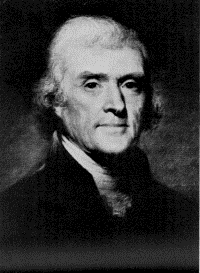Thomas Jefferson in Vermont
Thomas Jefferson
...and his ASTOUNDING resume'
 Thomas Jefferson was a hero of almost incalculable proportion. Against heavy historic tradition, he laid down a radical and brash new idea...that all men, knights, nobles, tailors or tinkers were equal in the eyes of God. Furthermore, he declared that no one should be allowed to govern without the consent of the governed... a ludicrous political idea in the 18th century.
Thomas Jefferson was a hero of almost incalculable proportion. Against heavy historic tradition, he laid down a radical and brash new idea...that all men, knights, nobles, tailors or tinkers were equal in the eyes of God. Furthermore, he declared that no one should be allowed to govern without the consent of the governed... a ludicrous political idea in the 18th century.
He proposed these ideas in the most important single page document ever written...The Declaration of Independence. This piece of paper, written by Mr. Jefferson in a sweltering Philadelphia in 1776 changed world history. Prior to that time, no country on earth allowed commoners to choose those who would govern them. Indeed this idea of Democracy was considered by many to be treasonous if not fool hardy. Even George Washington believed the idea would probably not work. Just in case, he chose kingly garments and trappings, should a transition back to an American Monarchy become necessary.
Today, for the first time in world history, more people live in democracy than those who live under totalitarian rule. Thomas Jefferson, more than anyone, deserves credit for this remarkable achievement.
Thomas Jefferson's Vermont Vacation
Our patron hero planned a vacation in Vermont for the summer of 1791, at a time when traveling for pleasure was rare. He invited his good friend James Madison to join him. Both were fed up with the heat and congestion of Philadelphia, and with politics that would make our present day variety seem tame. They planned to travel in Jefferson's distinctive black phaeton carriage, driven by his longtime manservant James Hemmings, a mulatto slave. The year after the trip, he set Hemmings free.
Like most of us, Jefferson was worried about the cost of the trip, and had to delay at first when a cash crop sale failed to materialize. Eventually, he would run out of money on the trip and have to borrow from Mr. Madison.
The trio traveled up the Hudson River and stopped at Lake George to sail and fish, catching "Salmon-trout", Oswego Bass, Rock Bass and Yellow Perch. James Hemmings had learned to cook in the French style while in Paris with Jefferson, and one can only envision those wonderful nights among the tall Maples, with the fresh-caught fish sizzling over a campfire.
Jefferson, in his fashion as a life-long chronicler, began to rate the inns where they stayed...giving a "+" sign for excellence, a "middling" sign or a "- " for lesser quality. Thirty-five years later, his granddaughter toured Vermont on her honeymoon, using his 1791 version of a guide to B&Bs!
The travelers had planned to sail all the way up the 110 mile Lake Champlain...to pass our present island of North Hero. What we would have given to greet them in our store!! In any case, high winds confounded this plan, and they were forced to turn back a Split Rock, well south of their goal. However, from some source, Jefferson learned an alarming fact about the goings on in North Hero. Though the Revolutionary War had be over for 4 years, and well settled by the Treaty of Paris, it was reported to him that the British had constructed a blockhouse and stationed a garrison "somewhat south of the border"...on North Hero Island. This, in his capacity as Secretary of State, he reported with concern to President Washington. The location of this blockhouse is well known today, the owners of the property having constructed a replica of the structure. It's presently known as Blockhouse Point.
Mr. Jefferson had an additional reason for making the journey to Vermont. Although the British had lost their prized American colonies, they were still in firm control of the Caribbean sugar trade, America's leading import, and a significant drain on U.S. cash reserves. Jefferson believed that the Sugar Maple, which he had never seen, might provide the answer! His idea was to see if Americans could be taught how to make sugar by boiling down the tree sap, and then ultimately, to have every citizen grow the trees on their own property for a ready supply of this truly domestic sweetener. While in Vermont, he ordered 60 Maple saplings for transport to his home in Monticello. When he reported his idea to a local newspaperman, the maple syrup export industry was born.
With thanks to William Stearne Randall, co-author of American Lives, a Longman Book.
Thomas Jefferson's Astounding Resume
We don't believe there is a man or woman of this millennium who acquired more skills, contributed more to his nation, or evidenced more curiosity than Mr. Jefferson. If you are proud of your own resume, read this one to regain your modesty.
Thomas Jefferson was:
-A farmer who managed over 10,000 acres. Also a trained surveyor and successful land speculator
-The owner of a profitable nail making factory
-An admired horseman, and horse breeder...still riding two months before his death at age 83
-A practicing architect. He designed his own home and the homes of many friends
-The founder of a university. He designed the campus, hired the professors, wrote the curriculum
-A respected and published naturalist, horticulturist and meteorologist
-An ardent chess player, accomplished violinist and singer. It is believed he owned a Stradivarius
-The President of the American Philosophical Society for twenty years
-A regent and alumnus of William and Mary College
-A diligent correspondent. More than 28,000 of his letters have survived
-Able to read, write and speak Latin, Greek, French and Italian. He studied Anglo-Saxon, German and American Indian dialects
-A voracious reader and book collector. He owned 2700 volumes by the age of forty
-The creator of the Library of Congress, the U.S. Patent Office, and the U.S. Monetary System
-A practicing lawyer, and two-term governor of the Commonwealth of Virginia
-U.S.Minister to France for five years, and the first U.S. secretary of State
-Vice President of the United States
-President of the United States for 2 terms
-Author of the most important single-page document ever written...The Declaration of Independence
